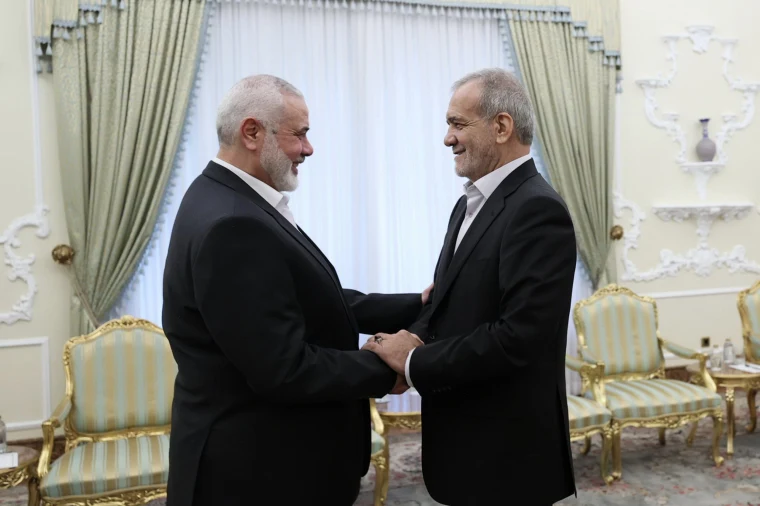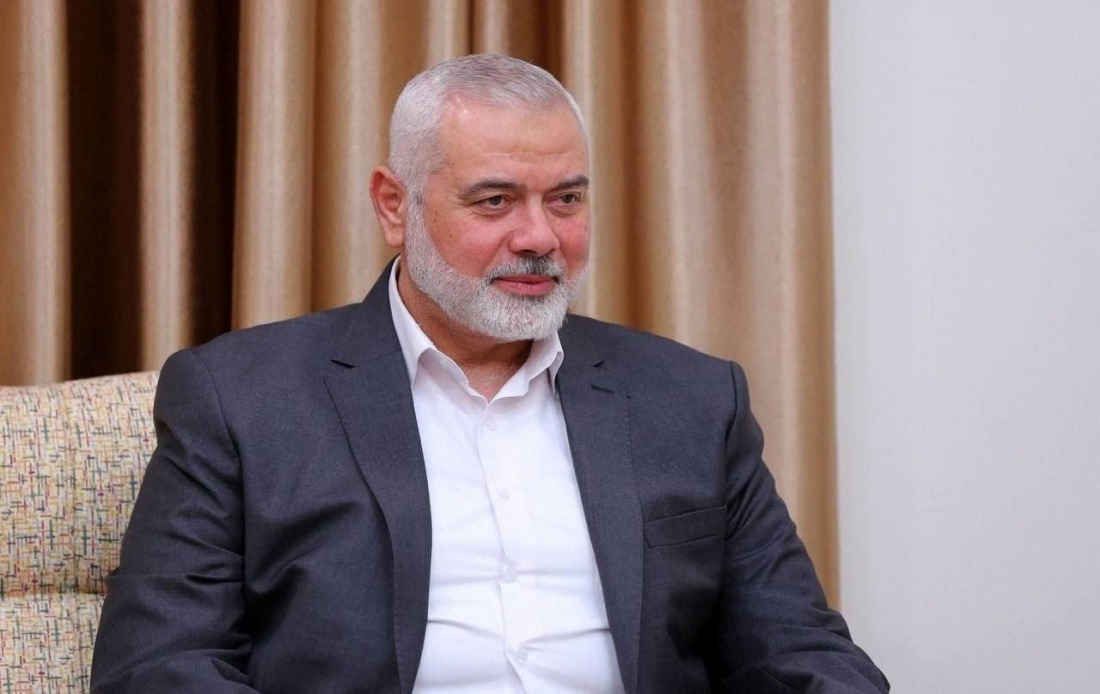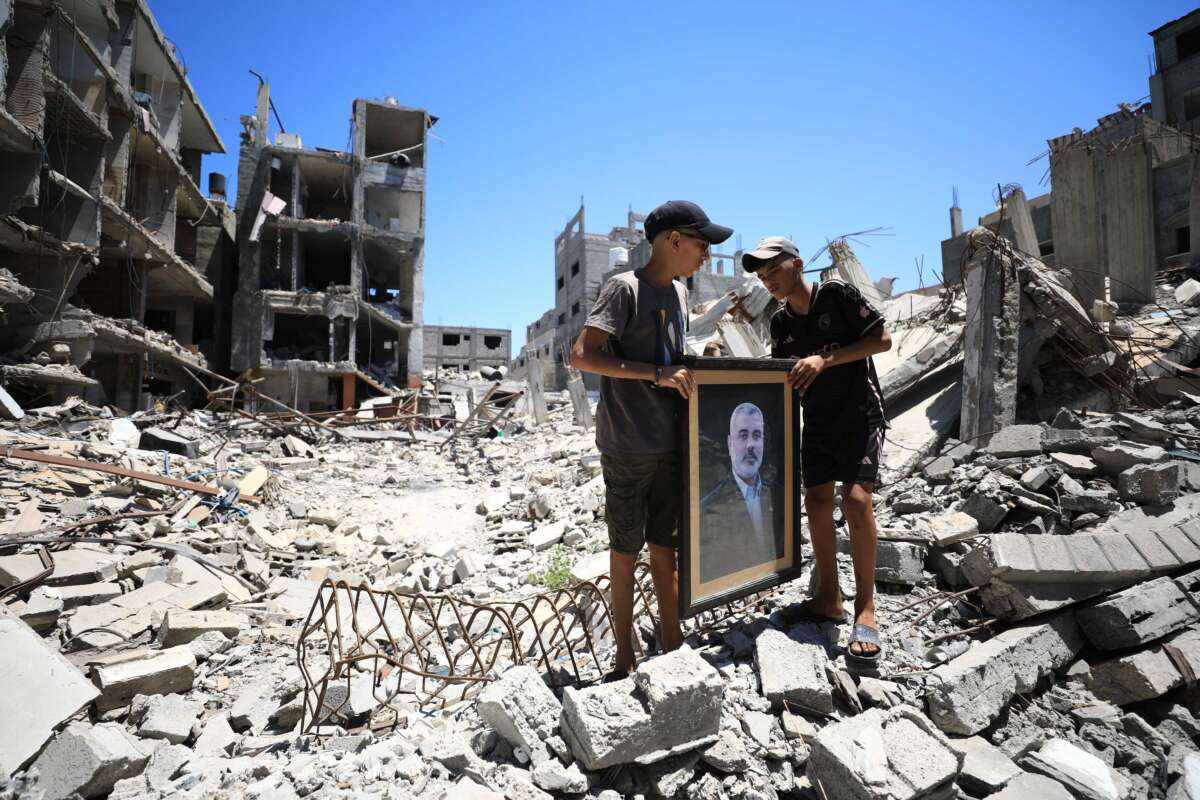In the ever-turbulent landscape of the Middle East, the intersection of geopolitics, armed conflict, and ideological divisions often gives rise to a barrage of information, disinformation, and speculation. One such rumor that recently surfaced is the alleged assassination of Hamas leader Ismail Haniyeh in Tehran. This report, if true, could have far-reaching implications not only for Hamas but also for the broader geopolitical dynamics of the region.
However, the authenticity of this claim remains highly contested, with various sources offering conflicting accounts of the event. This article delves into the background of Ismail Haniyeh, his role within Hamas, the strategic significance of Tehran in Hamas’s operations, and the implications of his potential assassination.
Who is Ismail Haniyeh?
Ismail Haniyeh is one of the most prominent figures in Hamas, a Palestinian militant organization that has been designated as a terrorist group by several countries, including the United States, the European Union, and Israel. Born in 1962 in the Al-Shati refugee camp in Gaza, Haniyeh has been a key player in the Palestinian struggle for statehood. He rose to prominence in the early 2000s, becoming the Prime Minister of the Palestinian Authority in 2006 after Hamas won a majority in the legislative elections.
However, following internal conflicts between Hamas and Fatah, Haniyeh was dismissed by Palestinian President Mahmoud Abbas in 2007, leading to the de facto division of the Palestinian territories, with Hamas controlling Gaza and the Palestinian Authority controlling the West Bank.
Haniyeh’s leadership has been characterized by his staunch opposition to Israel and his advocacy for armed resistance as a means to achieve Palestinian statehood. Under his leadership, Hamas has engaged in multiple conflicts with Israel, most notably in 2008-2009, 2012, 2014, and 2021. Despite international isolation and economic sanctions, Haniyeh has maintained a firm grip on power in Gaza, relying on a network of regional alliances and financial support from situstoto countries like Iran.

Tehran: A Crucial Ally
The relationship between Hamas and Iran is a key element in understanding the significance of the alleged assassination of Haniyeh in Tehran. Iran has long been a supporter of Hamas, providing financial, military, and logistical support to the organization. This alliance is rooted in a shared opposition to Israel and a mutual desire to counter Western influence in the Middle East. Tehran has viewed Hamas as a strategic ally in its broader regional ambitions, particularly in its efforts to project power and influence in the Arab world.
Haniyeh’s frequent visits to Tehran and his close relationship with Iranian leaders have been well-documented. In recent years, as the situation in Gaza has become increasingly dire due to the Israeli blockade and economic hardships, Iran’s support has been crucial for Hamas’s survival. This relationship has not been without its challenges, as Hamas is a Sunni organization, while Iran is a predominantly Shia country. However, the shared strategic interests have largely overridden these sectarian differences.
The Alleged Assassination: A Closer Look
News stations, print publications and social media quickly began picking up the news of Haniyeh’s assassination in Tehran. The reports suggest Haniyeh was assassinated in an operation to directly target him, likely carried out by Israeli intelligence service Mossad or another regional entity hostile to Hamas. Yet the absence of any proven findings or an official statement had sparked skepticism throughout those time.
A variety of reasons make the vagueness surrounding this rumor even more thick. First, Haniyeh is a prominent figure and Hamas would almost certainly lash out in response to any assassination attempt. That no reaction has so far been dispatched, together with the silence from Hamas’s leadesrhip are an indication itself that perhaps it is only a fable. Second, Tehran is a heavily fortified city – especially for foreign dignitaries such as Haniyeh – which means it’s hard to believe that an assassination of this nature could take place in the vicinity without being immediately discovered and covered by widespread reports.
And then there is the timing of the rumor. With ongoing wars in the three countries of Yemen, Iraq and Syria, as well as a sharp escalation between Israel and Palestinian militants in Gaza extremism has risen up among some factions across this volatile region. Misinformation and propaganda runs wild in these kinds of environments as a weapon to the authorities: perpetrators arrive with good party affiliations or sell cocaine at their own store etc. The report of the assassination attempt is being widely viewed as possibly a rumor meant to cause internal strife or shift focus from other more pressing matters.
Implications of Haniyeh’s Death
If the rumors that Haniyeh was assassinated were true, it would send shock waves throughout Hamas and have broader implications for the region as well. The death of Haniyeh would create an important power vacuum within Hamas, which could encourage internal struggle and a leadership dispute. Haniyeh has been a source of unity for Hamas, but his absence would deepen divides and hurt the group’s ability to run Gaza.
Moreover, the killing of Haniyeh would prompt greater tension between Israel and Hamas that could quickly spill over into renewed warfare. Hamas is sure as hell going to respond, probably with strikes on Israel or through other means and its proxies in the region. This could set off a larger war that brings in more players – Hezbollah from Lebanon and Iranian-backed militias across Syria and Iraq.
Haniyeh’s death would be a blow to the peace process between Israel and Palestinians on an international stage. Although the peace process has been moribund for many years, Haniyeh’s killing could add another impediment to obtaining a renewal of talks. As the protector of Palestinian righteousness — in its view, it would be an abomination the peace process — regional criminal gang Hamas has been led by Ismail Haniyeh. But this might have the opposite effect, simply entrenching positions on either side and making a negotiated settlement more distant.

Geopolitical Ramifications
The menace of Haniyeh’s supposed assassination extends farther the Israel-Palestine conflict. And losing someone like Haniyeh to the Iranian axis would be a huge setback for Iran’s presence throughout the Muslim world. Tehran has cultivated its alliance with Hamas in order to channel radical Palestinian fervor against Israel and throughout the Arab world. Haniyeh, 53 and one of Iran’s main allies in the Hamas Islamist group that rules aligned to opposition forces in Syria against President Basar al-Assad..
On the one hand Haniyeh’s assassination would be a blow to Hamas, on the other it may also benefit Israel if only as an competitive victory that removes an enemy and destabilizes activities for longer plans against poor supportments. Such a move, however could trigger unpredictable long-term consequences. Since Haniyeh only represents one faction within Hamas, and since a ‘Hit’ on him would also breed chaos in his own organization that could see more extremist elements take control of the already violent situation on-ground from Lebanon to Gaza.
Critical, too: how other regional actors would react to the supposed assassination of Haniyeh. Countries such Turkey and Qatar, with close Hamas contacts would be expected to condemn the attack and perhaps seek a mediation. At the same time, Saudi Arabia and the UAE would like to eliminate Iran-backed Haniyeh from Gaza [to avenge his killing Qassem Soleimani], who are already dealing with internal chaos.
The Role of Media and Misinformation
This incident itemizes the importance of media, rumors and misinformation in moulding public opinion as well as political stories within middle eastern regions. The line between truth and lies is a blurry one in a region where information is tightly controlled, frequently used as an instrument of statecraft fairness. The result is a truth that becomes harder to discern in the cacophony of contradictory reports and self-serving political agendas.
Social media platforms in particular have emerged as stakes of influence, with different actors using them to disseminate information and disinformation alike. The Haniyeh assassination rumor is a perfect example of how easily false information can travel Western communities and be exploited for political purposes. Or, as in this instance, it may be a tactic to sow discord within Hamas itself and/or prompt an armed response from its allies.
Navigating this information minefield is the task of journalists, analysts. For Haniyeh’s reputed death, that would involve assessing strictly the potential sources of information, considering its status in a wider geopolitical scene and judging what possible incentives there might be to spread such rumors.

Conclusion
The rumor of Ismail Haniyeh’s assassination in Tehran, while unconfirmed, has sparked significant debate and speculation about its potential implications for Hamas, the Israel-Palestine conflict, and the broader geopolitical dynamics of the Middle East. As a key figure within Hamas, Haniyeh’s death would undoubtedly have far-reaching consequences, both for the organization he leads and for the regional actors involved in the complex web of alliances and rivalries that characterize the Middle East.
However, in the absence of concrete evidence, it is crucial to approach such claims with caution and to consider the broader context in which they emerge. In a region where information is often manipulated for political purposes, the truth can be elusive. As such, the rumor of Haniyeh’s assassination may ultimately serve as a reminder of the importance of critical thinking and careful analysis in the face of uncertainty and speculation. If you like reading this article then please consider reading our article about Asia.



